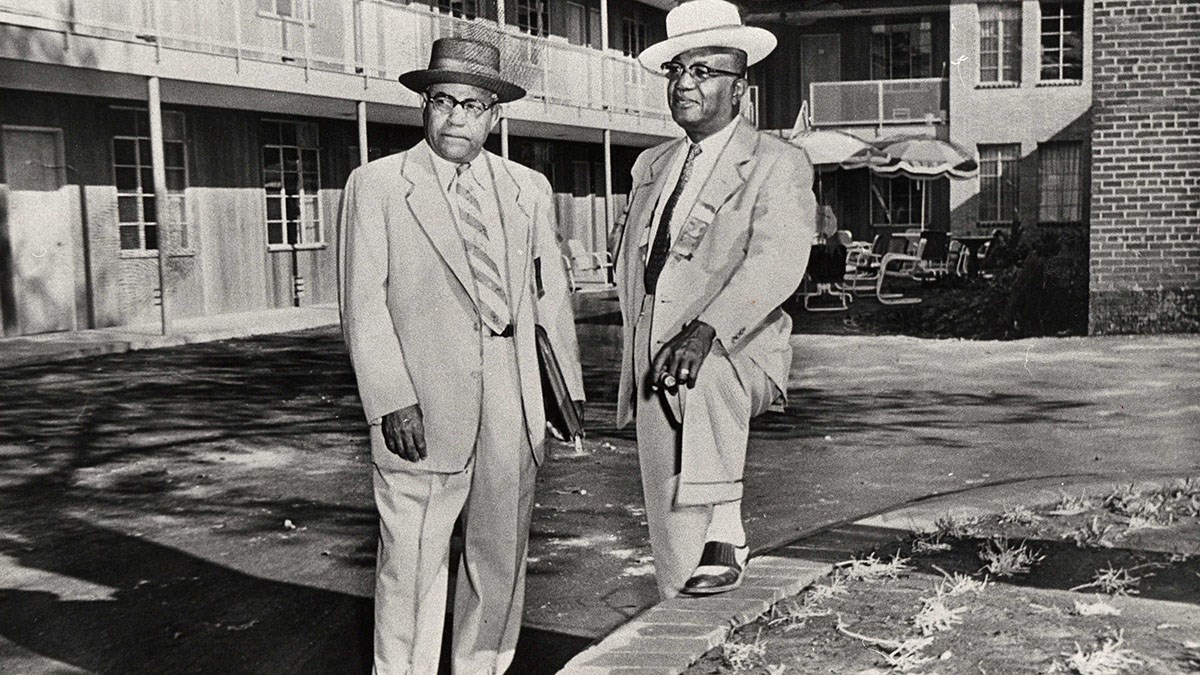May 13-15
Birmingham, AL
 |
| A.G. Gaston (right) in front of his motel with R.A. Hester. City of Birmingham Archives |
Arthur George Gaston died in 1996 with a net worth of $130 million. He was an innovator from the beginning, first earning some cash by letting the neighborhood kids ride his tire swing in exchange for their buttons, which the children's parents would buy back from him. As a young adult, he was a miner in Birmingham and provided lunches and burial insurance to his coworkers.
Gaston opened a business school, a funeral home, a savings and loan, and the A.G. Gaston Motel, which was listed in the Green Book. While he generally laid low to keep out of conflict with white society, he did provide financial assistance to the Civil Rights movement, and opened his motel to activists in the early 60's.
Dr. King stayed there during the Children's Crusade in 1963, a march in which children left school to walk downtown and talk with the mayor about segregation in Birmingham. Bull Connor, "Public Safety" officer, stopped the marches by using fire hoses and police dogs against the students. Here is the National Park Service narrative about the Motel and why it is part of the Birmingham Civil Rights National Monument.
The events of the Children's Crusade led to the arrest of Dr. King. Gaston's Motel was bombed; two devices exploded near Dr. King's room. Four months later, on September 15, 1963, four Klan members killed four girls and injured 14 others. The four who died were Addie Mae Collins, Cynthia Wesley, Carole Robertson, and Denise McNair. Addie Mae's sister, Sarah, was partially blinded in the explosion.
Gaston put up $160,000 bond for Dr. King.
 |
| A postcard from the Gaston Motel |
 |
| 2019 unveiling of A.G. Gaston Boulevard signs at the Gaston Motel. Bham Now |
 |
| Gaston Motel renovations underway during my visit. The firm completing the renovation is A.G. Gaston Construction. |
A.G. Gaston Building, right across the street from the Motel. I love this building.
More about Birmingham's people and industry
Hosea Hudson was an ironworker, and organizer, and a member of the Communist Party. He also sang bass in the L&N Quartet. He grew up as a Georgia sharecropper and worked in Atlanta and Nashville before heading to New York City to train with the Communist Party USA. Hudson settled in Birmingham as a WPA worker, joining the United Steelworkers of America during WWII. Ultimately, he was fired and blacklisted because of his communist affiliations. Birmingham Mayor Richard Arrington designated February 26, 1980 as "Hosea Hudson Day". Nell Irvin Painter worked with Hudson on her biography of him, The Narrative of Hosea Hudson: The Life and times of a Black Radical. Hudson wrote his own book in 1972 entitled Black Worker in the Deep South: A Personal Record.
Sloss Furnaces
I picked up a catfish sandwich and fried green tomatoes at Green Acres Cafe. Delicious.
More reading
Audio and Video
A video piece on Gaston's businesses and his support of the Civil Rights movement.
A video piece on Black workers at Sloss Furnaces.








No comments:
Post a Comment
don't be a robot